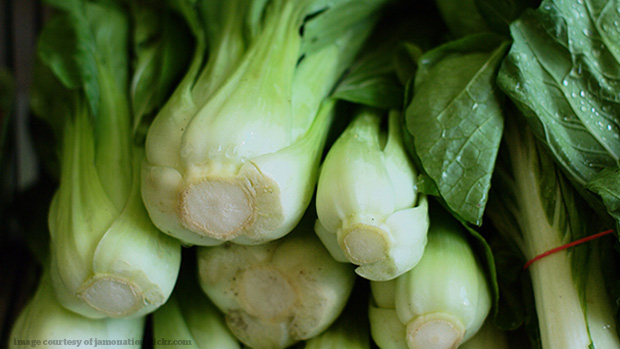It's Tuesday afternoon, which means I come home from work to a kitchen counter filled with bags of veggies and leafy greens. I dig through the produce: bok choy again. I've eaten more bok choy in the past three weeks than I have in the past three decades, but I suppose that's sort of the point: When you buy into a CSA farm, you take what the land gives you.
Eighth Day Farm is our local CSA, or Community Supported Agriculture, in Holland, Michigan. Simply put, CSA is a model of farming in which community members buy a share of a farm's produce before the season begins. This gives the farmer—in our case, Jeff Roessing—a guaranteed source of income, and gives CSA members a regular supply of fresh, local food.
So tonight it's stir-fried bok choy, again, with kohlrabi, garlic scapes, onions, and you-pick peas. My family is eating our greens (fresh, organic, and about as local as they come) because I see it as a deeply theological act. What my family eats matters to me because, like all aspects of this earthly life, food matters to God.
Food is a gift. In fact, food is the first gift. In one entirely accurate sense, all things from God's good hands are gifts, but I think food is somehow unique. Open a Bible to Genesis 1 and look at what God does in the creation story. More specifically, look at the verbs: God creates, he hovers, he says, he names, he separates, he makes and blesses and sees and declares it good. But it isn't until the end of the chapter, in verse 29, that he gives. And what does he give? Food.
"Behold," God says, "I have given you every plant and every tree. You shall have them for food."
Later, after the Flood, God adds animals: "Every moving thing that lives shall be food for you. And as I gave you the green plants, I give you everything" (Gen. 9:3).
When properly understood as a gift, it becomes clear that food is a tangible expression of God's love for us. As theologian Norman Wirzba has put it, food is "God's love made edible." It is one essential way that he shows his care for us (see Matt. 6:26). It is a physical embodiment of God's common grace, given for the good of his creation. And it's one of the practical means by which Jesus Christ sustains all things.
"Food is not a product," writes gardener and author Fred Bahnson in Making Peace with the Land. "It is not 'fuel for the machine.' It is not a commodity or a reflection of our technological ingenuity. It is before everything else an unearned gift from God, manna from heaven, a blessing."
Because food is a gift, how we handle it—what we eat and how we eat it—is much more than a matter of convenience, taste, desire, or consumption. How I respond to a gift is an indication of how I feel about the giver. And because food is a gift of God's good grace, I respond by eating—and supporting within my community—food that manifests God's grace well.
Which raises a significant question: Is it possible for particular foods to better manifest God's grace than other foods? I think so.
Food that causes our bodies harm misuses and ultimately abuses his gift of grace. When food is healthy and grown with reverence for its environment and with care for those in our communities—precisely the type of food grown by Eighth Day Farm—it provides genuine nourishment, body and soul.
Another question: Is it possible to eat this food in ways that better respond to God's gifts than other ways? Again, I think so.
God, Paul tells us, gives "rains from heaven and fruitful seasons, satisfying [our] hearts with food and gladness" (Acts 14:17). Eating, then, should bring us satisfaction and gladness because, properly understood, food testifies of God and his goodness. I've learned over back-deck dinners with our closest friends that the finest way to eat is joyfully, in fellowship with others and, above all, with a profound sense of gratefulness—not only for the food and the hands that prepared it, but primarily for the God who has given us such flavorful gifts.
We can fairly describe eating in this way as feasting, as a celebration not (as some might suppose) of excess and gluttony but one of pleasure and appreciation. "Taste and see that the Lord is good" (Psalm 34:8). Our eating should remind us of God's goodness, and make us uncommonly thankful for it.
To be honest, I'm still not very good at this. You'll find plenty of junk food in our pantry, and sneaking off alone to Burger King is an almost daily routine when my wife is out of town (did someone say "bacon sundae"?). I too often eat quickly and without gratitude. But I'm getting better at it, one bite at a time. I'm learning to intentionally choose food that makes me more aware of, and thankful for, the grace of God, and to eat that food with an abiding awareness of God and his goodness.
Which brings me back to Eighth Day Farm: I find it easier to see the connection between my dinner plate and my faith when I stroll past the farm a few blocks down the street. I look at the rows of vegetables and think of Psalm 65, which describes God's active role in preparing crops, watering the soil and blessing its growth.
We speak often of Christians as the hands and feet of Christ. When I see the hands and feet of Jeff and his volunteers sowing, cultivating and harvesting my bok choy, I can't help wondering if they are instruments God is using to accomplish his work and distribute his common grace to a fallen world.
Josh Bishop is a writer based in Holland. More at JoshBishopWrites.com.









